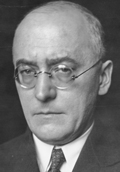 |
Heinrich Aloysius Maria Elisabeth Brüning
b. 26 Nov 1885, Münster, German Reich
d. 30 Mar 1970, Norwich, Vermont, United States |
| Title: |
Reichskanzler (Reich Chancellor) |
| Term: |
30 Mar 1930 - 10 Oct 1931 |
| Chronology: |
30 Mar 1930,
appointed, order issued by the Reich President on 30 Mar 1930 [1] |
| |
31 Mar 1930, took an oath of office as Reich Chancellor, swearing-in ceremony, Berlin [2] |
| |
|
| Term: |
10 Oct 1931 - 1 Jun 1932 |
| Chronology: |
10 Oct 1931,
appointed, order issued by the Reich President on 10 Oct 1931 [3] |
| |
30 May 1932,
resignation submitted to the Reich President, accepted pending the appointment of a successor [4] |
| |
1 Jun 1932,
discharged, order issued by the Reich President on 1 Jun 1932
[5] |
| Biography: |
| Born in the family of a wine merchant who died before his son reached the age of two years; was raised in a Catholic family; attended a gymnasium in Münster (to 1904); after a brief course of study in Munich as a law student, he moved to Strasbourg where he studied philosophy, history and political science; passed state examination for teaching in secondary schools in 1911, but decided to continue his education; attended the University of Bonn where he studied economics (1911-1914); despite his shortsightedness, he volunteered for military service and was assigned to army reserve unit; defended his doctoral thesis in 1915; joined the army in the rank of lieutenant and was twice wounded during World War I; worked in the Secretariat for Social Student Work, helping demobilized soldiers to study and work; was employed as personal assistant of the Prussian minister of welfare Adam Stegerwald (1919); with the help of Stegerwald, he assumed the post of director of the Federation of German Trade Unions (Deutscher Gewerkschaftsbund) in 1921-1930; through his contacts with the military and trade unionists in Berlin, he was involved in organisation of passive resistance to the occupation of Ruhr in 1923; elected to the Reichstag on the ticket of the German Centre Party (Deutsche Zentrumspartei, commonly known as Zentrum), representing Breslau (1924-1933); made a name for himself as a spokesman for fiscal and tax policy issues in the Reichstag; contributed to the passing of a law putting a limit on wage tax (known as Lex Brüning) in 1925; was elected to the Prussian Landtag (1928-1930); elected chairman of the Centre Party's faction in the Reichstag (1929-1930); appointed Reich Chancellor (30 Mar 1930 - 1 Jun 1932) and became the head of the first "presidential Cabinet" which did not enjoy the support of the Reichstag; became extremely unpopular due to implementation of austere economic measures aimed at liberating the national economy from war reparations; served as chairman of the Centre Party shortly before he was forced to dissolve it under the pressure of the Nazi government (5 Jul 1933); moved to the United States (1935), finally settling there as a Harvard professor (1939); returned to Germany and taught at the University of Cologne (1947), but without any prospect of resuming his political career in Germany he returned to the United States. |
| Biographical sources: Reichstags-Handbuch. II. Wahlperiode. 1924. Berlin: 1924. S. 393; Reichstags-Handbuch. III. Wahlperiode. 1924. Berlin: 1925. S. 215-216; Reichstags-Handbuch. IV. Wahlperiode. 1928. Berlin: 1928. S. 296-297; Reichstags-Handbuch. V. Wahlperiode. 1930. Berlin: 1930. S. 314; Reichstags-Handbuch. VI. Wahlperiode. 1932. Berlin: 1932. S. 50-51; Reichstags-Handbuch. VII. Wahlperiode. 1932. Berlin: 1933. S. 240-241; Reichstags-Handbuch. VIII. Wahlperiode. 1933. Berlin: 1933. S. 107; "Heinrich Brüning (1885-1970). Nationalist ohne Heimat", by Peer Oliver Volkmann (Düsseldorf: Droste, 2007). |
| |
| [1] |
Bundesarchiv, R 43 I/2875, fl. 4. |
| [2] |
Akten der Reichskanzlei: Weimarer Republik. Die Kabinette Brüning I und II (Boppard am Rhein: Boldt, 1982-1990), Band 1, S. 4 {Footnote}: "Abschrift der Niederschrift über die Vereidigung des Kabinetts Brüning vor dem RPräs. in R 43 II/499, Bl. 47–49." |
| [3] |
Bundesarchiv, R 43 I/2875, fl. 36. |
| [4] |
Akten der Reichskanzlei, op. cit., Band 3, S. 2586: "Dazu die „Tagesnotizen für Reichskanzler und Staatssekretär“ für den 30.5.32: „12–12.15 Uhr vorm. Vortrag beim Herrn Reichspräsidenten, dieser dauerte 3½ Minuten. Reichspräsident nahm die Demission des Kabinetts an und beauftragte den Herrn Reichskanzler und die Minister mit der Weiterführung ihrer Geschäfte“ (Nachl. Pünder, Nr. 44, Bl. 4)." |
| [5] |
Bundesarchiv, R 43 I/2875, fl. 43. |